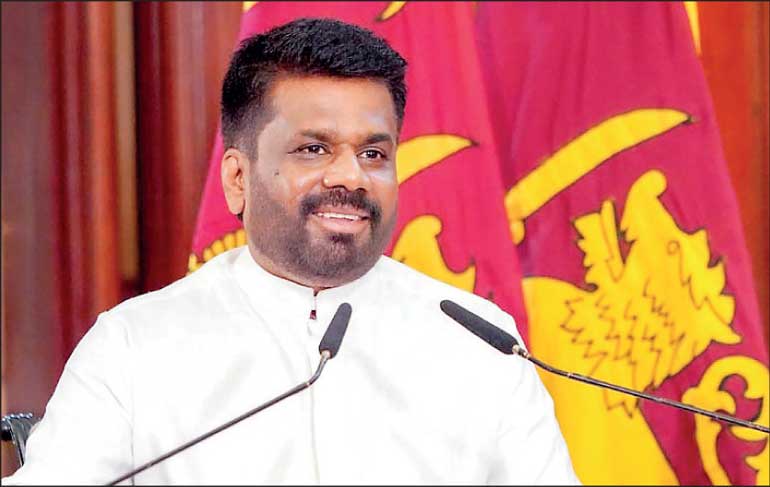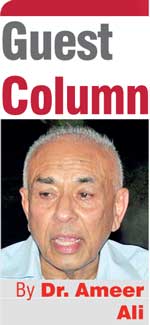Saturday Feb 21, 2026
Saturday Feb 21, 2026
Saturday, 14 December 2024 00:05 - - {{hitsCtrl.values.hits}}

While the domestically disgruntled political elements are looking for opportunities to make life difficult for President AKD and his NPP Government those very elements could become tools at the hands of foreign elements with their own strategic agenda
 On 21 August 2024 ‘Colombo Telegraph’ published an article titled, “Will the old order accept AKD victory?” The reason for raising that question then was because, of all the 39 contestants in the race for Presidency, including the two front runners Ranil Wickremesinghe (RW) and Sajith Premadasa (SP), only AKD stood for something radically different. While all the others had exhibited no understanding of the root cause of the poly-crises that plagued the nation and promising blindly to tackle them rather spasmodically with the help of foreign agencies and advisors, only AKD was advocating something entirely different.
On 21 August 2024 ‘Colombo Telegraph’ published an article titled, “Will the old order accept AKD victory?” The reason for raising that question then was because, of all the 39 contestants in the race for Presidency, including the two front runners Ranil Wickremesinghe (RW) and Sajith Premadasa (SP), only AKD stood for something radically different. While all the others had exhibited no understanding of the root cause of the poly-crises that plagued the nation and promising blindly to tackle them rather spasmodically with the help of foreign agencies and advisors, only AKD was advocating something entirely different.
He identified the root cause of the crises in the reigning political culture and system of governance and vowed to uproot them completely through a social revolution if voters gave him a clear mandate. In fact, he was giving voice to the political aspirations of a new generation of Sri Lankans some of whom gathered peacefully at the Galle Face Green in 2022 to express their loss of confidence on the Government of the day and demanded “system change”. That slogan expressed and elaborated repeatedly through the oratorical skill of AKD soon caught the imagination of a whole generation of voters, which finally resulted in his victory at the Presidential Election. That election was virtually transformed into a contest between the old and new orders.
But his victory however was not as overwhelming as the new generation had expected because of the less than 50% of votes garnered by AKD. His critics were quick to dub him as a minority president. Yet, it was an approval for system change none the less. However, since the majority did not vote for AKD his victory provided a window of opportunity to the two main losers, RW and SP, who are the products and beneficiaries of the old order and therefore had no appetite for any system change. They therefore decided to try their fortune at the General Election in November. Just like the Presidential contest in September the November election too promised to be a battle between two orders.
Will the ancient regime try short cuts?
Against all expectations the results turned out to be an avalanche with a massive swing of voter preference towards AKD’s National People’s Power (NPP). It was an avalanche because the votes he polled came from almost all corners of the country and from every community. With more than two-thirds of parliamentary seats captured, NPP is in an unassailable position to put into effect its program for system-change without compromising. But the humiliation suffered by his two main opponents and their close supporters is immeasurable. They still don’t seem to have recovered from that shock. Will they wait patiently for another five years to try their luck again, although RW would be nearing his eighth decade of his life? Or will the ancient regime try short cuts to end the rule of NPP through undemocratic means? This indeed is the worrying concern.
At the domestic front, while the majority of Sri Lankans are obviously fed up with the old order – an order which hijacked the country’s parliamentary democracy and its pluralist ethos to turn it virtually into a Sinhala-Buddhist majoritarian ethnocracy with a system of governance noted more for endemic corruption and mismanagement than honesty and accountability – and therefore welcomes the new alternative, there is a significant lot of disgruntled but influential elements that are licking their electoral wounds and wondering what to do next. Those elements will not rest until they recapture power and restore the ancient regime with vengeance.
There are enough instances in history where this had occurred. The 2011 post-Arab Spring experience of Egypt is among the more recent ones. A series of reforms that the new Government is scheduled to undertake such as the anti-corruption drive, ethnic reconciliation, secularising the country’s democracy with a new constitution, cleansing the market of mafia control and so on would provide ample opportunities for the losers to stirrup trouble.
Mixed reception at the foreign front
At the foreign front also, there is mixed reception for the new Government. Behind the diplomatic formality of congratulating AKD and his NPP there would certainly be concerns in certain quarters particularly in the West about the new regime’s leftist orientation and its soft corner for China on matters of strategic foreign relations. Even on the economic front, although AKD is committed to maintain an open free-market economy there would still be areas where the State needs to exert some control in the interest of rejuvenating the domestic production sector, achieving food security and maintaining a degree of economic independence.
Several developing countries especially in Africa and Latin America, which blindly got hooked to the open economy model of global capitalism have ultimately become net importers of even food items produced in rich countries, and consequently had fallen into financial debt. After 1978, Sri Lanka too followed the same track and is now struggling to pay back its huge debt. Ranil Wickremesinghe wanted to go along that way until 2048. Thank God! People rejected him. With a commitment to go along with the IMF agenda, NPP Government should look out for other avenues and possibilities to achieve its economic objectives.
IMF is more worried about financial stability than economic stability although the two are interconnected. But NPP wants to achieve both to become economically independent. Extra resources are therefore needed. It is in this context that ethnic reconciliation should be given priority in Government’s list of reforms. There is a huge amount of untapped investment potential lying outside the country and within the expatriate Tamil, Muslim and even Sinhalese communities which could be harnessed to rebuild the local economy. Ethnic reconciliation with corruption-free Government therefore becomes an absolute requirement to build an independent economy within the open economy model. AKD’s call for system change at home also sends a subtle message internationally that the reigning global capitalist model also needs change.
Concerns among certain foreign powers
All this no doubt would raise concern among certain foreign powers such as US, India, China and lately Israel at the foreign policy direction of the new regime. China’s One Belt Road and String of Pearls strategies are viewed by US as threats to its imperial domination. That threat may intensify once the Hawkish President Donald Trump enters the White House in January 2025. India too believes, as K.M. Panikkar once pointed out, that without control over the Indian Ocean its security would be jeopardised. China’s foothold at Hambantota is an eyesore to both these countries. And Israel as the most reliable agent of US and friend of India could play the role of an agent provocateur on Sri Lankan soil if necessity arises. The recent incident at Arugam Bay and mushrooming Chabad Houses should be a cause for concern to local authorities.
Thus, while the domestically disgruntled political elements are looking for opportunities to make life difficult for President AKD and his NPP Government those very elements could become tools at the hands of foreign elements with their own strategic agenda. In recent years Sri Lanka had been bedevilled with intelligence failures. If there is one area where the new Government needs pay immediate attention it is to improve the operation of its intelligence agencies. With full support from the masses, with Kautilya diplomacy and with sharp intelligence services Sri Lanka under NPP could regain its lost reputation as the most hospitable and peaceful democratic nation in the whole of Asia at least.
What has been discussed so far may sound farfetched and could be criticised as sheer fantasy. However, it is better to err on the side of caution than to be caught unprepared when the tremor strikes.
(The writer is attached to Business School, Murdoch University,
W. Australia.)